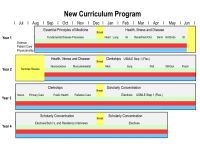
The foundations that make for a great doctor are firmly rooted in medical training and education, and lie at the heart of Weill Cornell Medical College's (WCMC) exciting new curriculum.
In 2010, in response to emerging innovative medical technologies and rapidly advancing scientific discoveries, a committed group of faculty, students and leadership began to plan this new curriculum, which is being phased in with the incoming Class of 2018.
The new curriculum consists of a series of "Learning Units," beginning August of Year 1 and extending through Year 4. In addition, three themes are incorporated throughout the four years: the scientific basis of medicine, patient care, and "physicianship" – the special skill set needed by physicians, such as communication, medical ethics, and professionalism).
Incoming students begin their medical school training with Essential Principles of Medicine (EPOM), an introduction to the fundamental concepts in basic scientific disciplines that students need before going on to the normal and abnormal biology. EPOM consists of 7 learning units, including anatomy (which runs through the entire segment). They then begin the 10-unit organ-based segment Health, Illness, and Disease, which focuses on both the physiology and pathophysiology of each of the organ systems. Students begin their clerkship year in January of Year II until December of Year III. These "immersion" clerkships can be taken in a relatively flexible order.
The new curriculum allows students more time (6 to 9 months) to explore and become "semi-experts" in a specialized area of interest (Areas of Concentration). This should result in a work product that might be suitable for publication and presented at a local, regional or national meeting. The scholarly study is supervised by a faculty mentor and might include didactics or electives in the specialized area and/or related clinical experience. Specialized areas of study are broadly defined to include basic science, clinical investigation and translational science, and population-based fields (e.g., global health, health-care policy, epidemiology and prevention). During their fourth year, students also are involved in other electives and residency interviews, in addition to the required one-month sub-internship.
The traditional sharp boundaries between two years of basic science, followed by two years of clinical medicine, have blurred. A major change in our curriculum now brings in basic science – especially translational science – into the third-year clerkships through a variety of possible venues (e.g., clinicopathological conferences, translational science seminars, rounding with basic science faculty and e-learning modules that return to science in a clinical context).
Similarly, students are introduced to clinical experiences early in their training. A longitudinal patient experience (LEAP) provides an opportunity for students, under the guidance of faculty mentors, to follow patients with chronic illnesses over the length of their training.
In addition, basic science units are increasingly more patient-centered: in addition to the Problem-Based Learning (PBL) case sessions that illustrate the "marriage" between basic science and clinical medicine, patients are invited into the classroom to illustrate the disease, its effect on patients' lives and the role of the health care system.
Faculty employ a wide array of progressive interactive learning formats. Traditional learning formats, such as in-class lectures, labs, PBL, seminars and small group exercises, continue to play an important role in student learning. With support from Education Information Technologies (ED IT) and instructional designers, faculty are implementing new methods of blended learning, such as creating short video podcasts, e-learning modules with student self-assessment and "world café" team-based learning (TBL) style approaches. In addition, clinical reasoning exercises have been increased, as well as opportunities for more clinical skills sessions, using standardized patients and simulators.

